PANASONIC KXTG6411FX, KXTG6412FX, KXTG6421FX User Manual
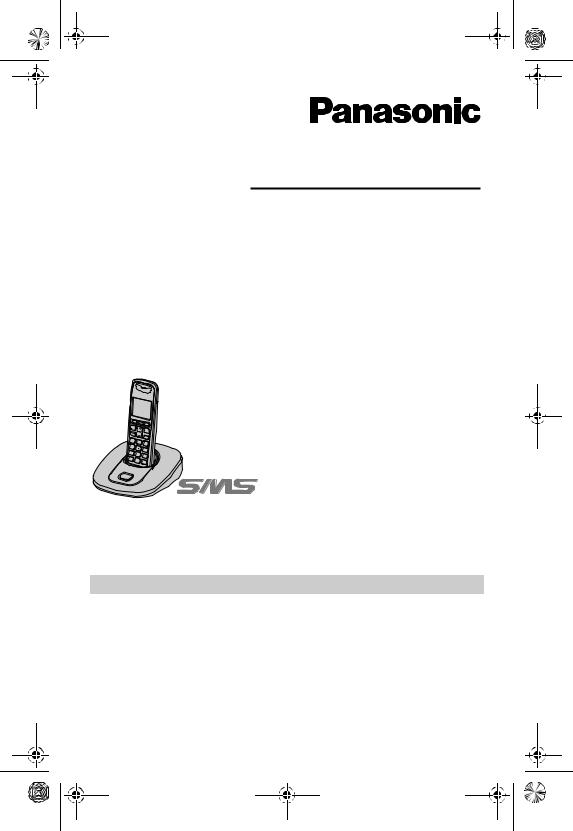
TG6411-6421FX(e).book Page 1 Friday, February 27, 2009 11:44 AM
Operating Instructions
Digital Cordless Phone
Model No. KX-TG6411FX
KX-TG6412FX
Digital Cordless Answering System
Model No. KX-TG6421FX
Model shown is KX-TG6411.
Thank you for purchasing a Panasonic product.
This unit is compatible with Caller ID and SMS. You must subscribe to the appropriate service offered by your service provider/telephone company.
Charge the batteries for about 7 hours before initial use.
To use this unit in your country, first change the unit’s region setting to match your country (page 25). Change the unit’s display language as needed (page 16).
(For Czech and Slovakia)
This cordless telephone is possible to use according to General licence No.: VO-R/8/08.2005-23 (for Czech), VPR-7/2001 (for Slovakia).
Please read these operating instructions before using the unit and save them for future reference.
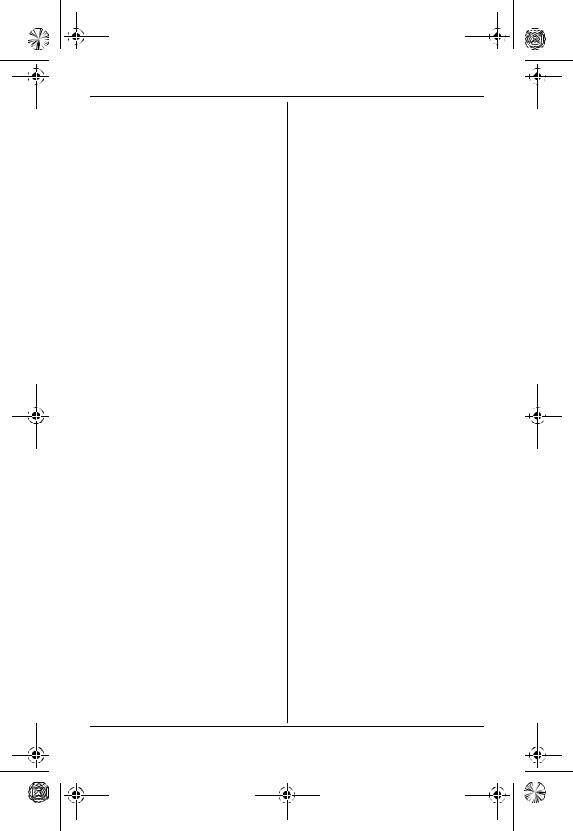
TG6411-6421FX(e).book Page 2 Friday, February 27, 2009 11:44 AM
Table of Contents
Introduction
Model composition . . . . . . . . . . . . . . . 3 Accessory information . . . . . . . . . . . . . 4 General information. . . . . . . . . . . . . . . 5
Important Information
For your safety . . . . . . . . . . . . . . . . . . 7 Important safety instructions . . . . . . . . 8 For best performance . . . . . . . . . . . . . 8 Specifications . . . . . . . . . . . . . . . . . . . 9
Getting Started
Setting up . . . . . . . . . . . . . . . . . . . . . 11 Note when setting up. . . . . . . . . . . . . 12 Controls. . . . . . . . . . . . . . . . . . . . . . . 13 Display. . . . . . . . . . . . . . . . . . . . . . . . 14 Turning the power on/off . . . . . . . . . . 15 Initial settings. . . . . . . . . . . . . . . . . . . 15
Making/Answering Calls
Making calls. . . . . . . . . . . . . . . . . . . . 17 Answering calls . . . . . . . . . . . . . . . . . 17 Useful features during a call . . . . . . . 18 Key lock. . . . . . . . . . . . . . . . . . . . . . . 19
Phonebook
Handset phonebook . . . . . . . . . . . . . 20 Copying phonebook entries. . . . . . . . 21
Programming
Programmable settings . . . . . . . . . . . 22 Special programming . . . . . . . . . . . . 25 Registering a unit . . . . . . . . . . . . . . . 27
Caller ID Service
Using Caller ID service . . . . . . . . . . . 29 Caller list . . . . . . . . . . . . . . . . . . . . . . 29
SMS (Short Message Service)
Using SMS . . . . . . . . . . . . . . . . . . . . 31 Turning SMS on/off . . . . . . . . . . . . . . 31 Storing SMS message centre numbers
. . . . . . . . . . . . . . . . . . . . . . . . . . . . . 31 Sending a message. . . . . . . . . . . . . . 32 Receiving a message . . . . . . . . . . . . 33 SMS settings . . . . . . . . . . . . . . . . . . . 34
Answering System
Answering system . . . . . . . . . . . . . . 35 Turning the answering system on/off 35 Greeting message . . . . . . . . . . . . . . 36 Listening to messages using the base unit . . . . . . . . . . . . . . . . . . . . . . . . . . 36 Listening to messages using the handset. . . . . . . . . . . . . . . . . . . . . . . 37 Remote operation. . . . . . . . . . . . . . . 38 Answering system settings. . . . . . . . 39
Voice Mail Service
Voice mail service. . . . . . . . . . . . . . . 41
Intercom/Locator
Intercom . . . . . . . . . . . . . . . . . . . . . . 42 Handset locator . . . . . . . . . . . . . . . . 42 Transferring calls, conference calls . 42
Useful Information
Character entry. . . . . . . . . . . . . . . . . 44 Error messages . . . . . . . . . . . . . . . . 47 Troubleshooting . . . . . . . . . . . . . . . . 48 Wall mounting. . . . . . . . . . . . . . . . . . 54
Index
Index. . . . . . . . . . . . . . . . . . . . . . . . . 55
2

TG6411-6421FX(e).book Page 3 Friday, February 27, 2009 11:44 AM
|
|
|
|
Introduction |
|
|
|
|
|
|
|
|
|
|
|
|
|
|
|
|
|
|
|
Model composition |
|
|
|
||
|
|
|
|
|
|
Series |
Model No. |
Base unit |
Handset |
|
|
Part No. |
Part No. |
Quantity |
|||
|
|
||||
KX-TG6411 |
KX-TG6411 |
KX-TG6411 |
KX-TGA641 |
1 |
|
series |
KX-TG6412 |
KX-TG6411 |
KX-TGA641 |
2 |
|
|
|||||
KX-TG6421 |
KX-TG6421 |
KX-TG6421 |
KX-TGA641 |
1 |
|
series |
|
|
|
|
|
LThe suffix (FX) in the following model numbers will be omitted in these instructions: KX-TG6411FX/KX-TG6412FX/KX-TG6421FX
Feature differences
Series |
Answering system |
Intercom |
|
Between handsets |
|||
|
|
||
KX-TG6411 series |
– |
r*1 |
|
KX-TG6421 series |
r |
r*1 |
*1 Intercom calls can be made between the handsets by purchasing and registering one or more optional handsets (page 5).
3
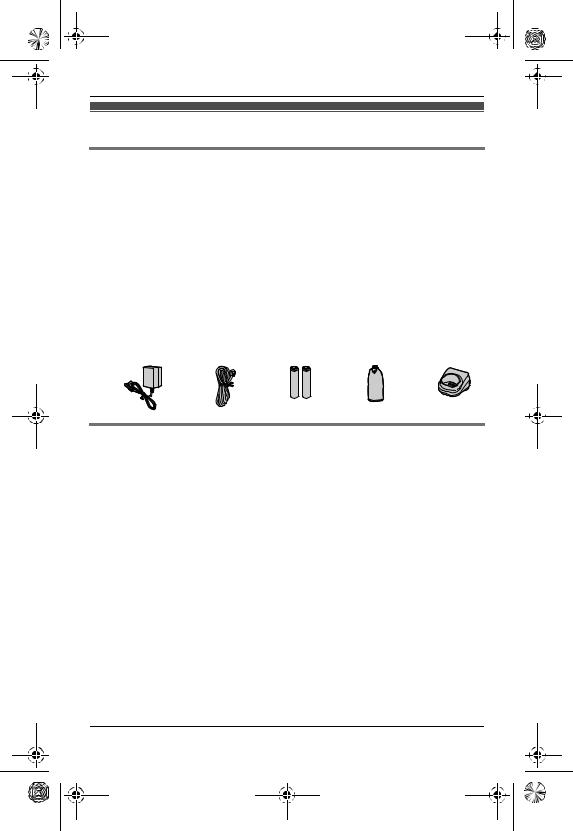
TG6411-6421FX(e).book Page 4 Friday, February 27, 2009 11:44 AM
Introduction
Accessory information
Supplied accessories
|
|
Quantity |
|
No. |
Accessory item/Part number |
KX-TG6411 |
KX-TG6412 |
|
|
KX-TG6421 |
|
1 |
AC adaptor/PQLV219CE |
1 |
2 |
2 |
Telephone line cord |
1 |
1 |
3 |
Rechargeable batteries*1/ |
2 |
4 |
|
HHR-55AAAB or N4DHYYY00005 |
|
|
4 |
Handset cover*2 |
1 |
2 |
5 |
Charger |
— |
1 |
*1 |
See page 4 for replacement battery information. |
|
|
||
*2 |
The handset cover comes attached to the handset. |
|
|||
1 |
2 |
3 |
4 |
5 |
|
Additional/replacement accessories
Please contact your nearest Panasonic dealer for sales information.
Accessory item |
Model number |
Rechargeable |
P03P, HHR-4MRE, or HHR-4MPT*1 |
batteries |
Battery type: |
|
– Nickel metal hydride (Ni-MH). |
|
– 2 x AAA (R03) size for each handset. |
DECT repeater |
KX-A272 |
*1 Replacement batteries may have a different capacity from that of the supplied batteries.
4
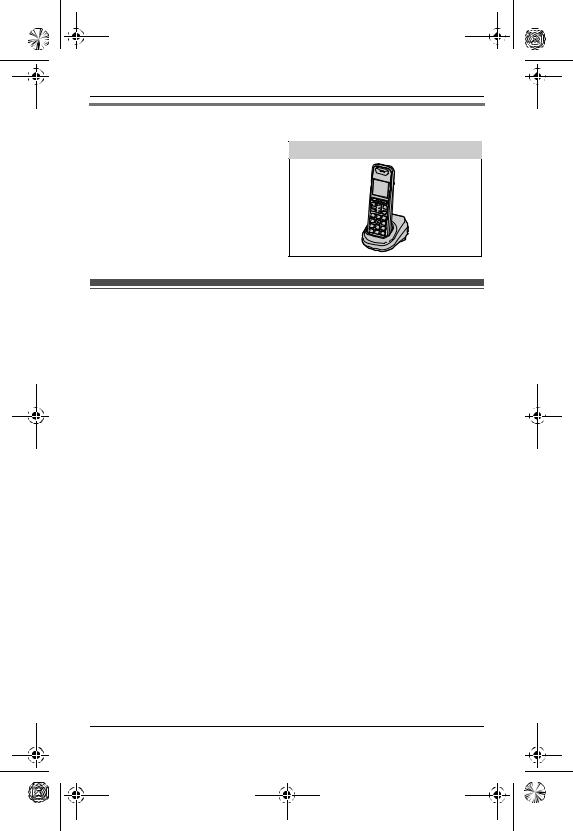
TG6411-6421FX(e).book Page 5 Friday, February 27, 2009 11:44 AM
Introduction
Expanding your phone system
You can expand your phone system by
registering optional handsets (6 max.) Handset (optional): KX-TGA641FX to a single base unit.
General information
L This equipment is designed for use on the Czech and Slovakia analogue telephone network.
L In the event of problems, you should contact your equipment supplier in the first instance.
L For use in other countries, please contact your equipment supplier.
Declaration of Conformity:
L Panasonic Communications Co., Ltd. declares that this equipment is in compliance with the essential requirements and other relevant provisions of Radio & Telecommunications Terminal Equipment (R&TTE) Directive 1999/5/EC. Declarations of Conformity for the relevant Panasonic products described in this manual are available for download by visiting:
http://www.doc.panasonic.de
Contact to Authorised Representative:
Panasonic Testing Centre Panasonic Marketing Europe GmbH
Winsbergring 15, 22525 Hamburg, Germany
5
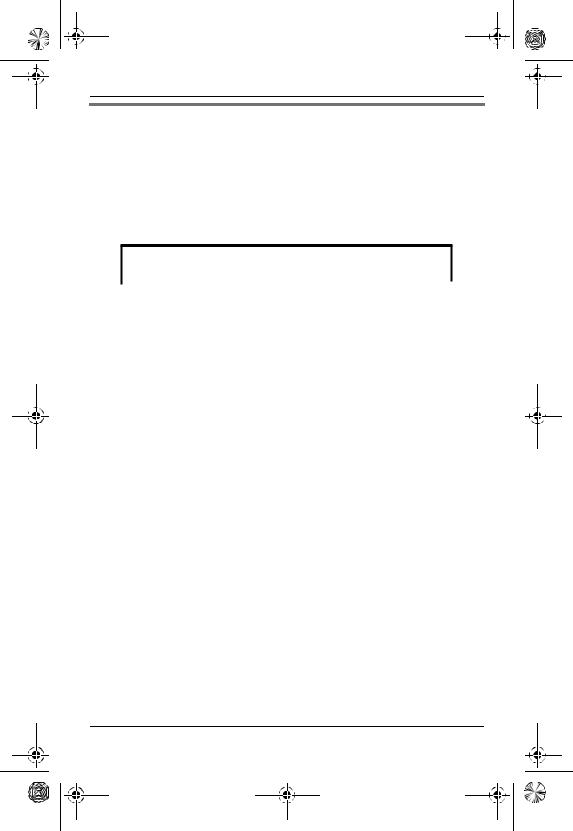
TG6411-6421FX(e).book Page 6 Friday, February 27, 2009 11:44 AM
Introduction
For your future reference
We recommend keeping a record of the following information to assist with any repair under warranty.
Serial No. |
Date of purchase |
(found on the bottom of the base unit) |
|
Name and address of dealer |
|
Attach your purchase receipt here.
6
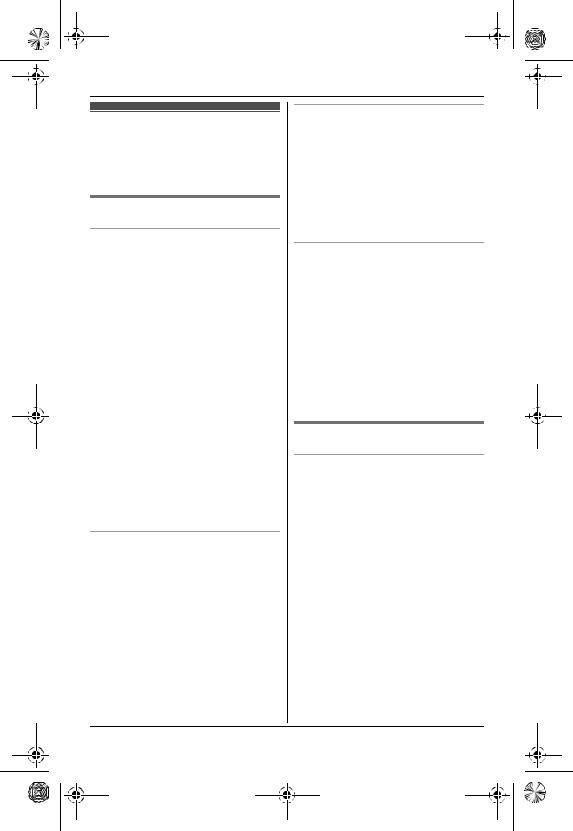
TG6411-6421FX(e).book Page 7 Friday, February 27, 2009 11:44 AM
Important Information
For your safety
To prevent severe injury and loss of life/property, read this section carefully before using the product to ensure proper and safe operation of your product.
WARNING
Power connection
LUse only the power source marked on the product.
LDo not overload power outlets and extension cords. This can result in the risk of fire or electric shock.
LCompletely insert the AC adaptor/power plug into the power outlet. Failure to do so may cause electric shock and/or excessive heat resulting in a fire.
LRegularly remove any dust, etc. from the AC adaptor/power plug by pulling it from the power outlet, then wiping with a dry cloth. Accumulated dust may cause an insulation defect from moisture, etc. resulting in a fire.
LUnplug the product from power outlets if it emits smoke, an abnormal smell, or makes an unusual noise. These conditions can cause fire or electric shock. Confirm that smoke has stopped emitting and contact an authorised service centre.
LUnplug from power outlets and never touch the inside of the product if its casing has been broken open.
LNever touch the plug with wet hands. Danger of electric shock exists.
Installation
LTo prevent the risk of fire or electrical shock, do not expose the product to rain or any type of moisture.
LDo not place or use this product near automatically controlled devices such as automatic doors and fire alarms. Radio waves emitted from this product may cause such devices to malfunction resulting in an accident.
LDo not allow the AC adaptor or telephone line cord to be excessively pulled, bent or placed under heavy objects.
Operating safeguards
LUnplug the product from power outlets before cleaning. Do not use liquid or aerosol cleaners.
L Do not disassemble the product.
LDo not spill liquids (detergents, cleansers, etc.) onto the telephone line cord plug, or allow it to become wet at all. This may cause a fire. If the telephone line cord plug becomes wet, immediately pull it from the telephone wall jack, and do not use.
Medical
LConsult the manufacturer of any personal medical devices, such as pacemakers or hearing aids, to determine if they are adequately shielded from external RF (radio frequency) energy. (The product operates in the frequency range of 1.88 GHz to 1.90 GHz, and the RF transmission power is 250 mW (max.).)
LDo not use the product in health care facilities if any regulations posted in the area instruct you not to do so. Hospitals or health care facilities may be using equipment that could be sensitive to external RF energy.
CAUTION
Installation and relocation
LNever install telephone wiring during an electrical storm.
LNever install telephone line jacks in wet locations unless the jack is specifically designed for wet locations.
LNever touch uninsulated telephone wires or terminals unless the telephone line has been disconnected at the network interface.
LUse caution when installing or modifying telephone lines.
LThe AC adaptor is used as the main disconnect device. Ensure that the AC outlet is installed near the product and is easily accessible.
LThis product is unable to make calls when:
–the handset batteries need recharging or have failed.
–there is a power failure.
–the key lock feature is turned on.
7
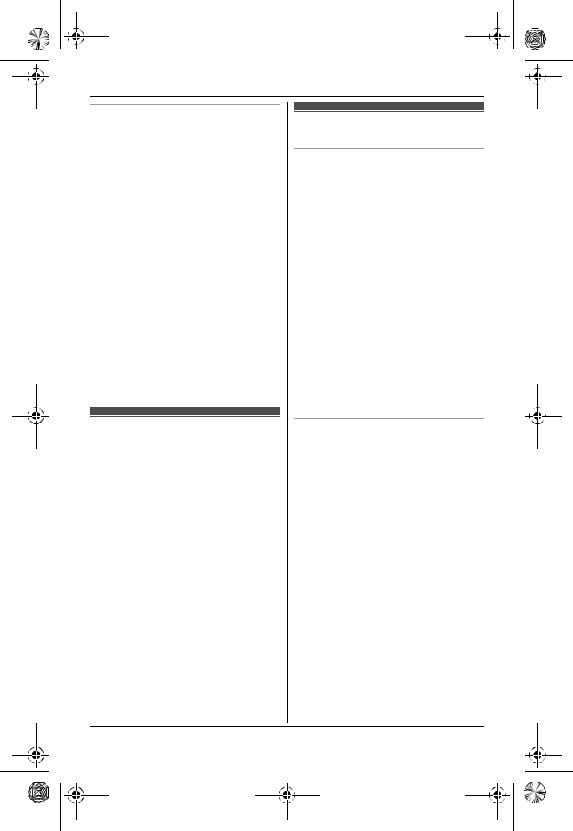
TG6411-6421FX(e).book Page 8 Friday, February 27, 2009 11:44 AM
Important Information
Battery
LWe recommend using the batteries noted on page 4. USE ONLY rechargeable Ni-
MH batteries AAA (R03) size.
L Do not mix old and new batteries.
LDo not open or mutilate the batteries. Released electrolyte from the batteries is corrosive and may cause burns or injury to the eyes or skin. The electrolyte is toxic and may be harmful if swallowed.
LExercise care when handling the batteries. Do not allow conductive materials such as rings, bracelets, or keys to touch the batteries, otherwise a short circuit may cause the batteries and/or the conductive material to overheat and cause burns.
LCharge the batteries provided with or identified for use with this product only, in accordance with the instructions and limitations specified in this manual.
LOnly use a compatible base unit (or charger) to charge the batteries. Do not tamper with the base unit (or charger). Failure to follow these instructions may cause the batteries to swell or explode.
Important safety instructions
When using your product, basic safety precautions should always be followed to reduce the risk of fire, electric shock, and injury to persons, including the following:
1.Do not use this product near water for example, near a bathtub, washbowl, kitchen sink, or laundry tub, in a wet basement or near a swimming pool.
2.Avoid using a telephone (other than a cordless type) during an electrical storm. There may be a remote risk of electric shock from lightning.
3.Do not use the telephone to report a gas leak in the vicinity of the leak.
4.Use only the power cord and batteries indicated in this manual. Do not dispose of batteries in a fire. They may explode. Check with local codes for possible special disposal instructions.
SAVE THESE INSTRUCTIONS
For best performance
Base unit location/avoiding noise
The base unit and other compatible Panasonic units use radio waves to communicate with each other.
LFor maximum coverage and noise-free communications, place your base unit:
–at a convenient, high, and central location with no obstructions between the handset and base unit in an indoor environment.
–away from electronic appliances such as TVs, radios, personal computers, wireless devices, or other phones.
–facing away from radio frequency transmitters, such as external antennas of mobile phone cell stations. (Avoid putting the base unit on a bay window or near a window.)
LCoverage and voice quality depends on the local environmental conditions.
LIf the reception for a base unit location is not satisfactory, move the base unit to another location for better reception.
Environment
LKeep the product away from electrical noise generating devices, such as fluorescent lamps and motors.
LThe product should be kept free from excessive smoke, dust, high temperature, and vibration.
LThe product should not be exposed to direct sunlight.
LDo not place heavy objects on top of the product.
LWhen you leave the product unused for a long period of time, unplug the product from the power outlet.
LThe product should be kept away from heat sources such as radiators, cookers, etc. It
should not be placed in rooms where the temperature is less than 0 ° C or greater than 40 ° C. Damp basements should also be avoided.
LThe maximum calling distance may be shortened when the product is used in the following places: Near obstacles such as hills, tunnels, underground, near metal objects such as wire fences, etc.
8
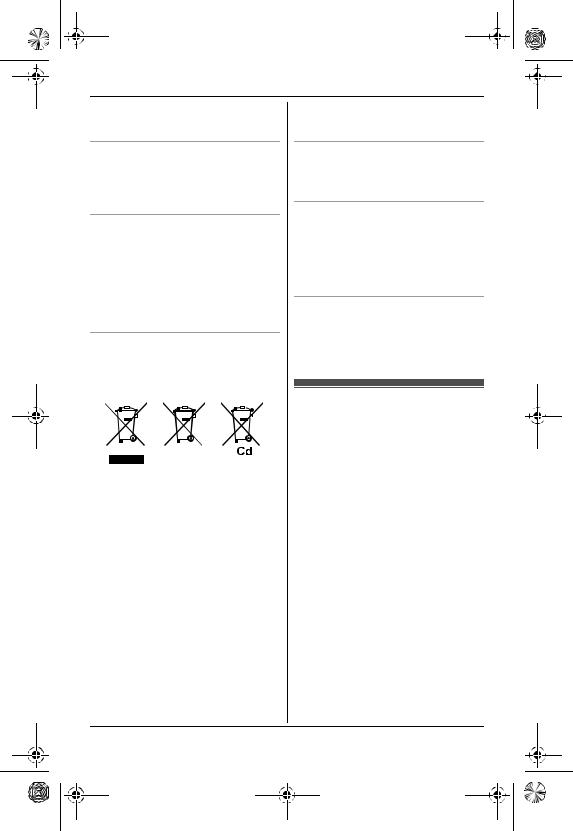
TG6411-6421FX(e).book Page 9 Friday, February 27, 2009 11:44 AM
Important Information
LOperating the product near electrical appliances may cause interference. Move away from the electrical appliances.
Routine care
LWipe the outer surface of the product with a soft moist cloth.
LDo not use benzine, thinner, or any abrasive powder.
Notice for product disposal, transfer, or return
LThis product can store your private/ confidential information. To protect your privacy/confidentiality, we recommend that you erase information such as phonebook or caller list entries from the memory before you dispose of, transfer, or return the product.
Information for Users on Collection and Disposal of Old Equipment and used Batteries
1 2 3
These symbols (1, 2, 3) on the products, packaging, and/or accompanying documents mean that used electrical and electronic products and batteries should not be mixed with general household waste.
For proper treatment, recovery and recycling of old products and used batteries, please take them to applicable collection points, in accordance with your national legislation and the Directives 2002/96/EC and 2006/66/EC. By disposing of these products and batteries correctly, you will help to save valuable resources and prevent any potential negative effects on human health and the environment which could otherwise arise from inappropriate waste handling.
For more information about collection and recycling of old products and batteries, please contact your local municipality, your waste disposal service or the point of sale where you purchased the items.
Penalties may be applicable for incorrect disposal of this waste, in accordance with national legislation.
For business users in the European Union
If you wish to discard electrical and electronic equipment, please contact your dealer or supplier for further information.
Information on Disposal in other Countries outside the European Union
These symbols (1, 2, 3) are only valid in the European Union. If you wish to discard these items, please contact your local authorities or dealer and ask for the correct method of disposal.
Note for the battery symbol
This symbol (2) might be used in combination with a chemical symbol (3). In this case it complies with the requirement set by the Directive for the chemical involved.
Specifications
■Standard:
DECT (Digital Enhanced Cordless Telecommunications), GAP (Generic Access Profile)
■Frequency range:
1.88 GHz to 1.90 GHz
■RF transmission power:
Approx. 10 mW (average power per channel)
■Power source:
220–240 V AC, 50 Hz
■Power consumption: Base unit*1:
Standby: Approx. 0.7 W
Maximum: Approx. 3.8 W
Base unit*2:
Standby: Approx. 0.8 W Maximum: Approx. 4.2 W
Charger:
Standby: Approx. 0.2 W Maximum: Approx. 3.2 W
■Operating conditions:
0 °C – 40 °C, 20 % – 80 % relative air humidity (dry)
*1 KX-TG6411/KX-TG6412
*2 KX-TG6421
9
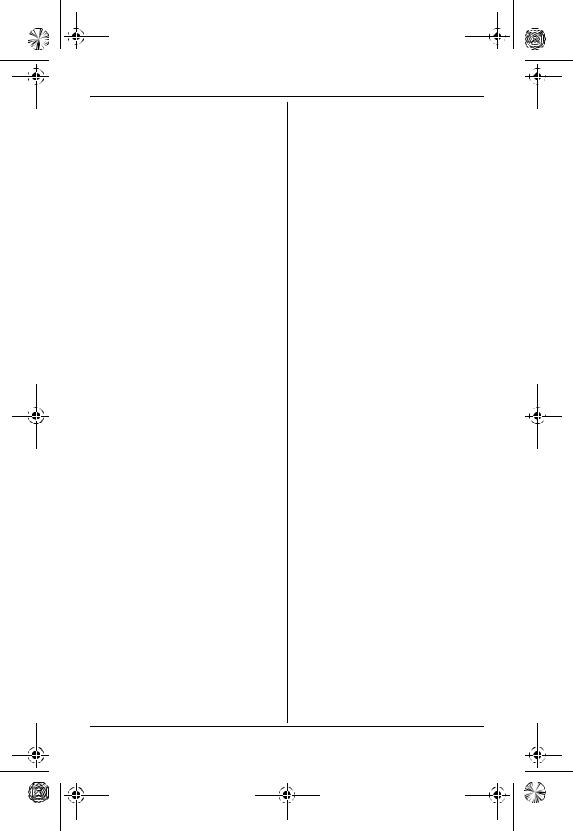
TG6411-6421FX(e).book Page 10 Friday, February 27, 2009 11:44 AM
Important Information
Note:
LDesign and specifications are subject to change without notice.
LThe illustrations in these instructions may vary slightly from the actual product.
10
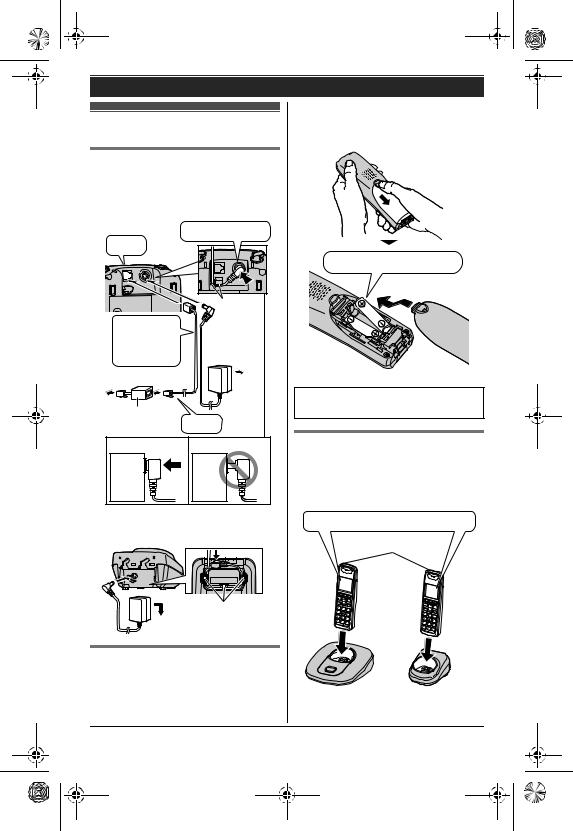
TG6411-6421FX(e).book Page 11 Friday, February 27, 2009 11:44 AM
Getting Started
Setting up
Connections
L Use only the supplied Panasonic AC adaptor PQLV219CE.
■ Base unit
Press plug firmly.
“Click”
Hooks
Use only the
supplied |
|
telephone |
(220-240 V |
line cord. |
AC, 50 Hz) |
To telephone line |
|
DSL/ADSL filter* |
|
(Not supplied) |
“Click” |
Correct |
Wrong |
Base |
Base |
unit |
unit |
*For DSL/ADSL service users
■ Charger
Hooks
(220-240 V AC, 50 Hz)
Battery installation
LUSE ONLY Ni-MH batteries AAA (R03) size.
LDo NOT use alkaline/Manganese/NiCd batteries.
L Confirm correct polarities (S, T).
Rechargeable Ni-MH ONLY
L When the language selection is displayed, see page 16.
Battery charge
Charge for about 7 hours.
L When the batteries are fully charged, the charge indicator goes off.
Confirm “Charging” is displayed.
Charge indicator
11
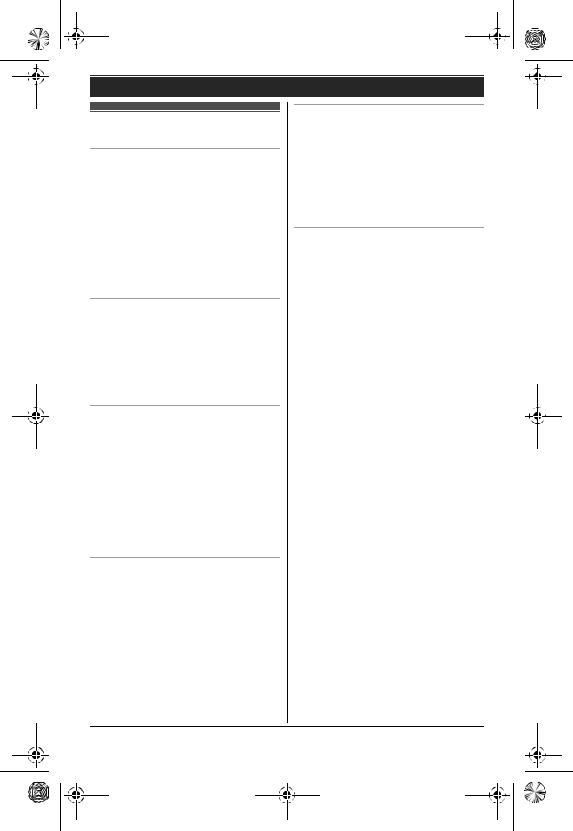
TG6411-6421FX(e).book Page 12 Friday, February 27, 2009 11:44 AM
Getting Started
Note when setting up
Note for connections
L The AC adaptor must remain connected at all times. (It is normal for the adaptor to feel warm during use.)
L The AC adaptor should be connected to a vertically oriented or floormounted AC outlet. Do not connect the AC adaptor to a ceiling-mounted AC outlet, as the weight of the adaptor may cause it to become disconnected.
During a power failure
The unit will not work during a power failure. We recommend connecting a corded-type telephone (without AC adaptor) to the same telephone line or to the same telephone line jack, if you have such a telephone jack in your house.
Note for battery installation
L Use the supplied rechargeable batteries. For replacement, we recommend using the Panasonic rechargeable batteries noted on page 4, 8.
LWipe the battery ends (S, T) with a dry cloth.
L Avoid touching the battery ends (S, T) or the unit contacts.
Note for battery charge
L It is normal for the handset to feel warm during charging.
L Clean the charge contacts of the handset, base unit, and charger with a soft and dry cloth once a month. Clean more often if the unit is exposed to grease, dust, or high humidity.
Battery level
Icon |
Battery level |
& |
High |
( |
Medium |
) |
Low |
0)4 |
Needs charging. |
Panasonic Ni-MH battery performance (supplied batteries)
Operation |
Operating time |
In continuous |
18 hours max. |
use |
|
Not in use |
170 hours max. |
(standby) |
|
Note:
L It is normal for batteries not to reach full capacity at the initial charge. Maximum battery performance is reached after a few complete cycles of charge/discharge (use).
L Actual battery performance depends on a combination of how often the handset is in use and how often it is not in use (standby).
L Even after the handset is fully charged, the handset can be left on the base unit or charger without any ill effect on the batteries.
L The battery level may not be displayed correctly after you replace the batteries. In this case, place the handset on the base unit or charger and let it charge for at least 7 hours.
12
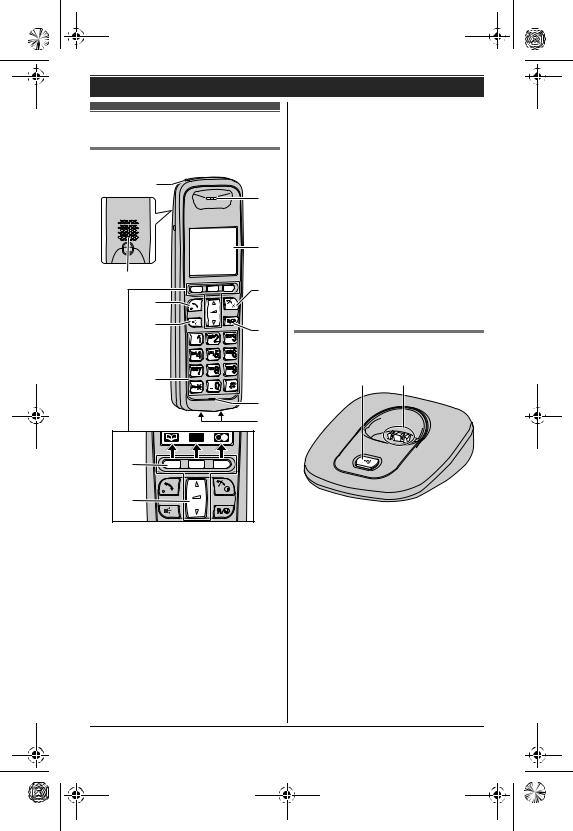
TG6411-6421FX(e).book Page 13 Friday, February 27, 2009 11:44 AM
|
|
|
|
Getting Started |
|
|
K Charge contacts |
|
|
Controls |
|
■ Control type |
|
|
|
|
A Soft keys |
|
|
Handset |
|
The handset features 3 soft keys. By |
||
|
pressing a soft key, you can select the |
|||
A |
|
feature shown directly above it on the |
||
|
display. |
|
||
|
F |
|
||
|
B Navigator key/? (Volume) key |
|||
|
|
|||
|
|
By pressing this key ({^} or {V}) |
||
|
|
repeatedly, you can: |
||
|
G |
– |
scroll through (up or down) various |
|
|
|
|
lists or items |
|
B |
|
– |
adjust the receiver or speaker |
|
|
H |
|
volume (up or down) while talking |
|
|
– move the cursor (left or right) to edit |
|||
C |
|
|||
D |
|
|
number or name |
|
I |
|
|
|
|
|
Base unit |
|
||
|
|
|
||
|
|
■ KX-TG6411/KX-TG6412 |
||
E |
|
|
A |
B |
|
J |
|
|
|
|
K |
|
|
|
A |
|
|
|
|
B |
|
|
|
|
|
|
A {x} (Locator) |
|
|
A Charge indicator |
|
B Charge contacts |
|
|
Ringer indicator |
|
|
|
|
BSpeaker
C{C} (Talk)
D{s} (Speakerphone)
EDial keypad
FReceiver
GDisplay
H{ih} (Off/Power)
I{R/E}
R: Recall/Flash
E: Alarm shortcut key
J Microphone
13
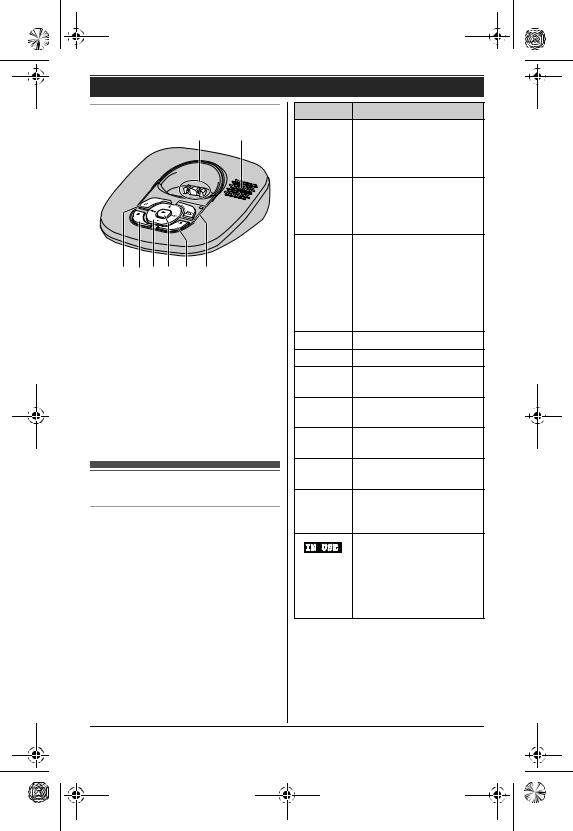
TG6411-6421FX(e).book Page 14 Friday, February 27, 2009 11:44 AM
Getting Started
■ KX-TG6421
A B
C D E F G H
ACharge contacts
BSpeaker
C{4} (Erase)
D{■} (Stop)
E{^}/{V} (Volume up/down) {7}/{8} (Repeat/Skip)
F{6} (Play)
Message indicator
G{x} (Locator)
H{s} (Answer on)
Answer on indicator
Display
Handset display items
Item |
Meaning |
w |
Within range of a base |
|
unit |
|
L When flashing: |
|
Handset is searching |
|
for base unit. (page |
|
50) |
x |
Paging, intercom mode. |
k |
Handset is on an outside |
|
call. |
y |
Missed call*1 (page 29) |
Item Meaning
DWhen displayed next to the battery icon:
Answering system is on.*2 (page 35)
uWhen displayed with a
number: New messages have been recorded.*2 (page 37)
dAnswering system answers calls with a greeting message and
caller messages are not recorded.*2 (“Caller’s recording time”, page 40)
&Battery level
E Alarm is on. (page 25)
:Privacy mode is on. (page 23)
~Ringer volume is off. (page 23)
7Blocked call*1, *2 (page 26, 29)
hNew SMS message received.*3 (page 33)
#New voice mail message received.*4 (page 41)
L Someone is using the line.
L Answering system is being used by another
handset or the base unit.*2
*1 Caller ID subscribers only
*2 KX-TG6421
*3 SMS users only
*4 Voice mail subscribers only
14
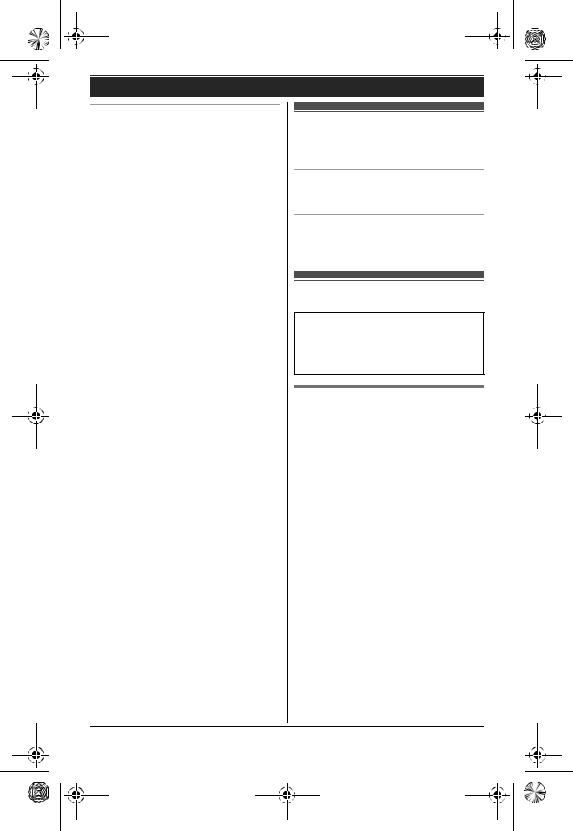
TG6411-6421FX(e).book Page 15 Friday, February 27, 2009 11:44 AM
Getting Started
Soft key icons
Icon |
Action |
U |
Returns to the previous |
|
screen. |
8 |
Displays the menu. |
M |
Accepts the current |
|
selection. |
j |
Displays a previously |
|
dialled phone number. |
n |
Opens the phonebook. |
~ |
Stores phone numbers in |
|
the call barred list.*1 (page |
|
26) |
( |
Displays the character |
|
entry mode for phonebook |
|
search. (page 20) |
& |
Turns the key lock feature |
|
off. (page 19) |
/ |
Selects a character entry |
|
mode. |
O |
Stops recording or |
|
playback.*1 |
l |
Inserts a dialling pause. |
W |
Erases the selected item. |
4 |
Allows you to make an |
|
intercom call. |
9 |
Switches the screen. (page |
|
29) |
^ |
Erases a number/character. |
1 |
Puts the call on mute. |
*1 KX-TG6421
Turning the power on/off
Power on
Press {ih} for about 1 second.
Power off
Press {ih} for about 2 seconds.
Initial settings
Symbol meaning: Example: {V}/{^}: “Off”
Press {V} or {^} to select the words in quotations.
Region settings
You can set the unit to use settings that match your country (page 25). The display language and other settings will change accordingly.
Note:
L The display language only changes (to the selected country’s default setting) for the handset used to select the region setting. You must change the display language for all other handsets separately.
15
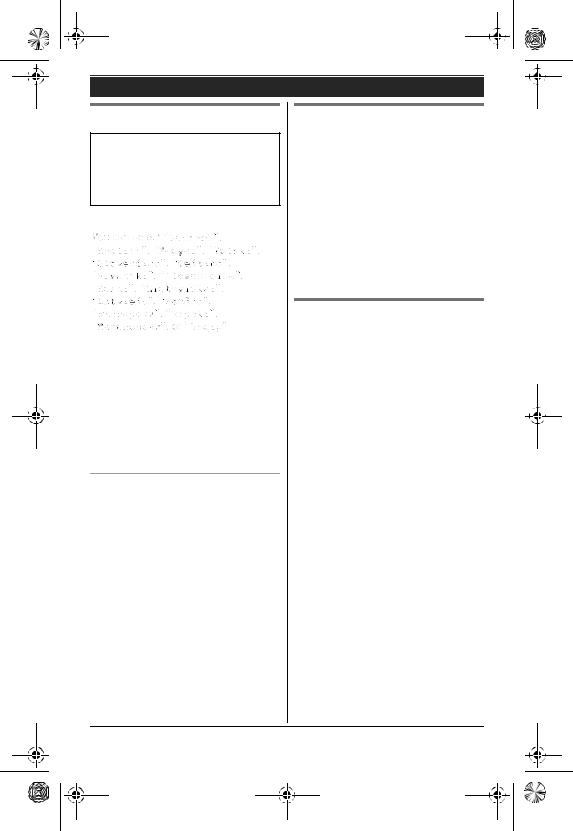
TG6411-6421FX(e).book Page 16 Friday, February 27, 2009 11:44 AM
Getting Started
Display language
Important:
L When the language selection is displayed after installing the batteries for the first time, perform step 5.
16 display languages are available.
1 |
8(middle soft key) |
2 |
{V}/{^}: “Handset Setup” i |
|
M |
3 |
{V}/{^}: “Display Setup” i |
|
M |
4 |
{V}/{^}: “Language” i M |
5 |
{V}/{^}: Select your desired |
|
language. i Mi {ih} |
If you select a language you cannot read
1{ih} i 8
2Proceed with the operation for your model.
■KX-TG6411/KX-TG6412
{^} 3 times i M
■KX-TG6421
{^} 4 times i M
3{V} 2 times i M2 times i {V}/{^}: Select your desired language. i Mi {ih}
Dialling mode
If you cannot make calls, change this setting according to your telephone line service. The default setting is “Tone”. “Tone”: For tone dial service. “Pulse”: For rotary/pulse dial service.
18(middle soft key)
2{V}/{^}: “Base Unit Setup” i
M
3{V}/{^}: “Dial Mode” i M
4{V}/{^}: Select the desired setting. i Mi {ih}
Date and time
18(middle soft key)
2{V}/{^}: “Handset Setup” i
M
3{V}/{^}: “Time Settings” i
M
4{V}/{^}: “Set Date/Time” i
M
5Enter the current date, month, and year. i M
Example: 15 July, 2009
{1}{5} {0}{7} {0}{9}
6Enter the current hour and minute.
Example: 9:30
{0}{9} {3}{0}
L You can select 24-hour or 12-hour clock format (“AM” or “PM”) by pressing {*}.
7Mi {ih}
Note:
L To correct a digit, press {^} or {V} to move the cursor to the digit, then make the correction.
L The date and time may be incorrect after a power failure. In this case, set the date and time again.
16
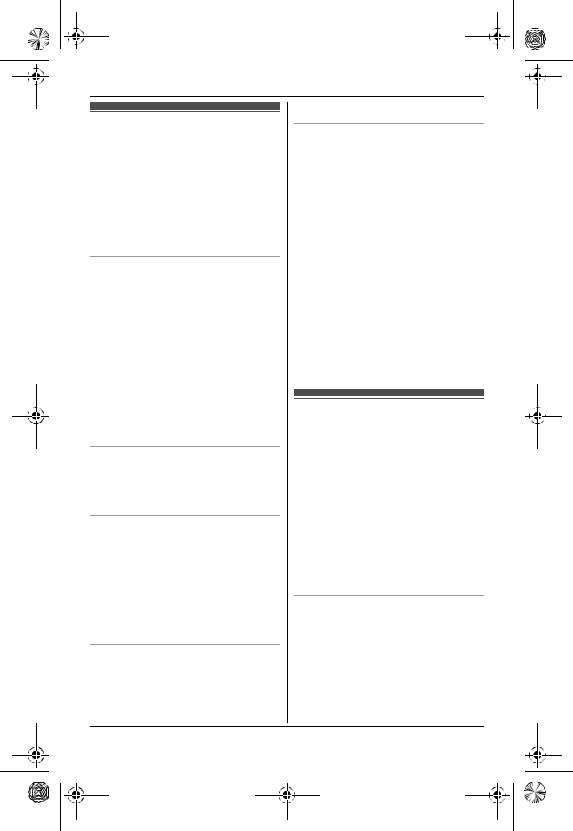
TG6411-6421FX(e).book Page 17 Friday, February 27, 2009 11:44 AM
Making/Answering Calls
Making calls
1Lift the handset and dial the phone number.
L To correct a digit, press ^.
2{C}
3When you finish talking, press {ih} or place the handset on the base unit or charger.
Using the speakerphone
1Dial the phone number and press
{s}.
L Speak alternately with the other party.
2When you finish talking, press
{ih}.
Note:
L For best performance, use the speakerphone in a quiet environment.
L To switch back to the receiver, press
{C}.
Adjusting the receiver or speaker volume
Press {^} or {V} repeatedly while talking.
Making a call using the redial list
The last 10 phone numbers dialled are stored in the redial list (each 24 digits max.).
1j(right soft key)
2{V}/{^}: Select the desired phone number.
3{C}
Erasing a number in the redial list
1j(right soft key)
2{V}/{^}: Select the desired phone number. i 8i M
3 {V}/{^}: “Yes” iMi{ih}
Pause (for PBX/long distance service users)
A pause is sometimes required when making calls using a PBX or long distance service. When storing a calling card access number and/or PIN in the phonebook, a pause is also needed (page 21).
Example: If you need to dial the line access number “0” when making outside calls with a PBX:
1{0} i l
2Dial the phone number. i {C}
Note:
L A 3 second pause is inserted each time lis pressed. Repeat as needed to create longer pauses.
Answering calls
When a call is being received, the ringer indicator on the handset flashes.
1Lift the handset and press {C} or {s} when the unit rings.
L You can also answer the call by pressing any dial key from {0} to
{9}, {*}, or {#}. (Any key answer feature)
2When you finish talking, press {ih} or place the handset on the base unit or charger.
Auto talk
You can answer calls simply by lifting the handset off the base unit or charger. You do not need to press {C}. To turn this feature on, see page 22.
17
